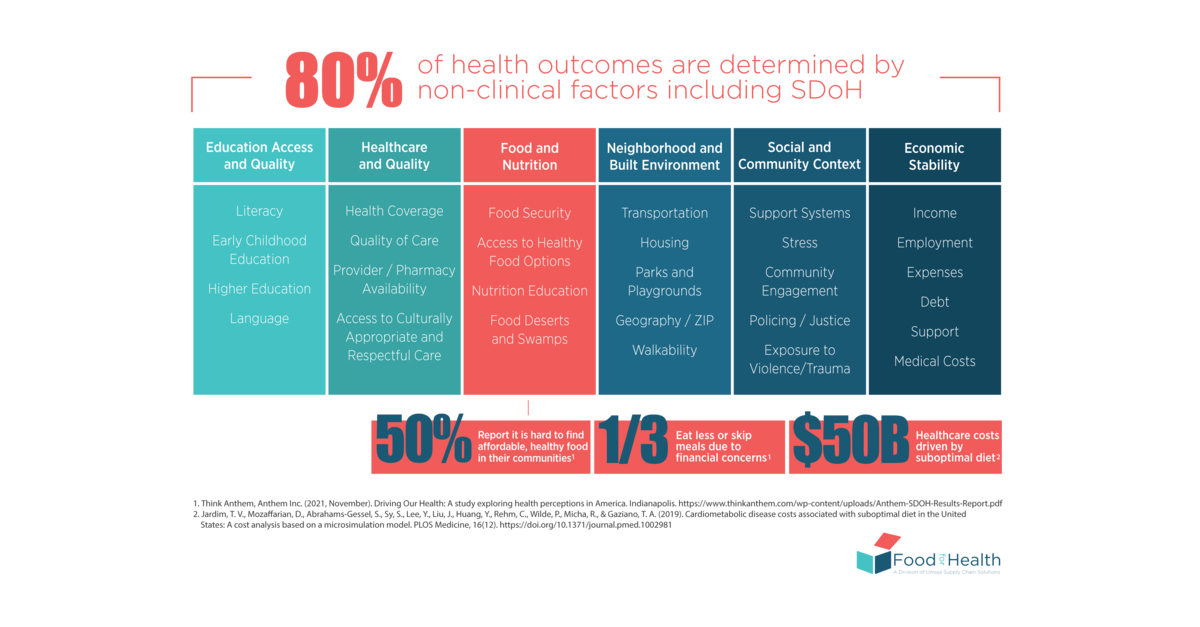
HOUSTON--(BUSINESS WIRE)--As a nation, we continue to ignore the significant and lasting economic, social, and health impacts of nutrition insecurity at our own peril. Suboptimal diets are a leading risk factor for chronic diseases. With 6 in 10 adults in the U.S. living with a chronic condition, nearly 20% of children under 19 living with obesity, and healthcare expenditures approaching $4 trillion, food-as-medicine interventions must become a formal component of patient care.
“The pandemic has further compelled us to re-examine food and health systems, making this an opportune time to explore new ideas and to develop creative partnerships addressing suboptimal diets and widespread nutrition inequities,” said Dr. James Gillespie, Chief Health Officer at Umoja Food For Health and a member of the Milken Institute’s Food Is Medicine Task Force. In their white paper Food For Health: the positive economic, medical, and social impact of nutrition as an intervention, Dr. Gillespie and co-author Dr. Gregory Privitera of St. Bonaventure University explore key findings indicating the outsized influence food and nutrition access have on aspects of individual and community-wide health, and how interventions tailored to address these gaps can have a positive impact on our national health.
A lack of access to nutritious foods is a key driver of poor health and mortality in rural areas and communities of color, as evidenced by higher rates of the costliest and most debilitating chronic conditions including Type 2 diabetes, cardiovascular disease and stroke, arthritis, and the risk factors that lead to them, including obesity. Those most at risk are Black or Hispanic, younger, and have overall lower education levels and lower income. “By making food-for-health programs more accessible; delivering tailored meals, groceries and fresh produce; and providing education to drive long-lasting behavioral change, we can change the landscape of health,” says Dr. Gillespie.
To manage or prevent chronic diseases, to build healthier communities, to reduce healthcare spending, we must look at overall health through a broader lens. We must innovate in addressing barriers to nutrition and healthcare. And we must deploy more food-as-medicine initiatives at local, state, and federal levels to ensure nutrition security for millions of Americans and address social determinants of health.
About Umoja Food For Health
Food For Health offers medically tailored meal, grocery and produce programs delivering nutritious foods and educational tools to improve health, address social determinants of health, and support the prevention or management of chronic conditions. Food For Health is a division of Umoja Supply Chain Solutions. Umoja leverages decades of expertise in food and logistics to tackle big problems with big solutions through four core divisions – Hunger Relief, Food For Health, Third-party Logistics, and Government. Umoja is mission-driven, with a focus on ensuring equity and access to quality food and healthcare for all. www.umojasupply.com/food-for-health. https://www.linkedin.com/company/umoja-supply/.
Article From & Read More ( Re-examining Food and Health Systems: Food Delivery Programs Address Social Determinants of Health and Food Justice - Business Wire )https://ift.tt/UeTxEqk
food

Tidak ada komentar:
Posting Komentar